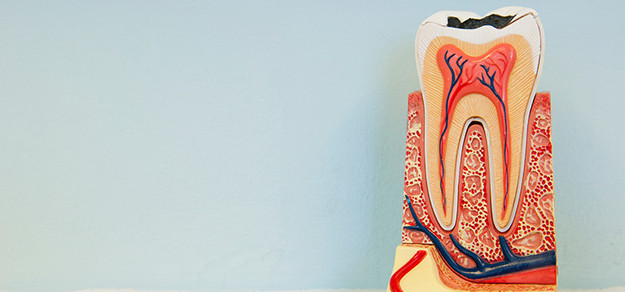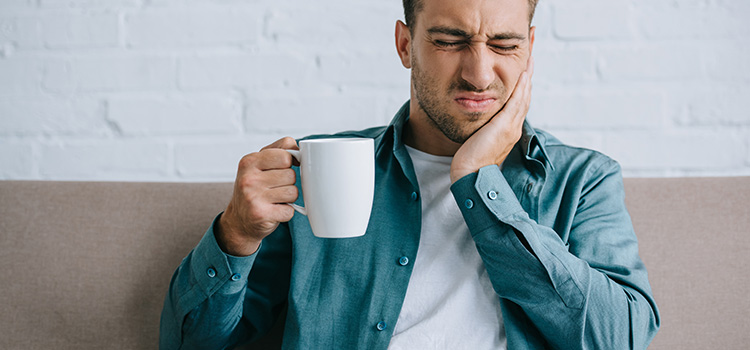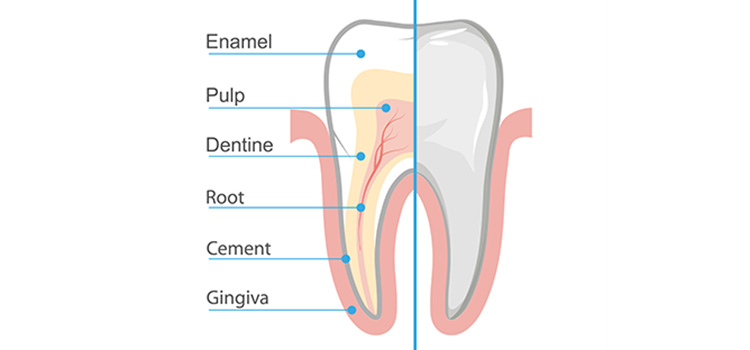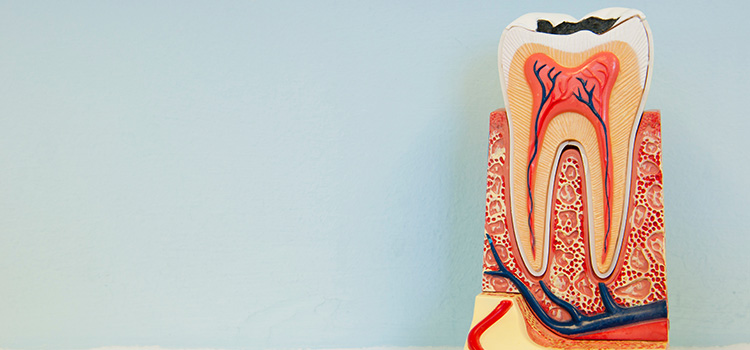Exposed Dentin: Causes and Treatment
14th Mar 2020

You never order steaks or ice cream these days, because you know you’ll experience a shooting pain when those foods contact your teeth. You’re worried about the underlying issues and wonder if your teeth will feel normal again. If you have increased tooth sensitivity or anything from tingling pain or shooting pain associated with your teeth, you might suffer from exposed dentin on tooth.
In this article, we’ll discuss what this means, how to avoid it, and how to treat it. You only get one set of teeth. Plus, once dentin goes away, it doesn’t come back. Read on to understand how to care for your teeth and the dentin that protects them.

What Is Dentin And Exposed Dentin?
Dentin is a soft layer that is directly beneath the enamel of the teeth. It is filled with the innermost layer called pulp which contains microscopic tubules, or hollow tubes, containing nerve endings.
Dentin becomes exposed when enamel, a strong layer that covers your dentin, wears down or the gum lines recede.
Dentin is composed of tiny channels, called dentinal tubules, that connect to the nerves. Dentin exposure usually causes sensitivity or pain since the nerves can be easily stimulated. Heat, cold, and any kind of pressure can cause sensitivity to the exposed dentin on tooth.

Common symptoms of exposed dentin
Common symptoms of exposed dentin include:
Sensitivity:
Feeling a twinge of shooting pain when you eat certain foods like hard candies and hot or cold foods like ice cream or warm soup.
Discoloration:
When dentin is exposed, teeth usually appear more yellow.
Cracked or Chipped Teeth:
When enamel erodes, teeth may become jagged and change shape.
See your dentist immediately if you begin to see the above symptoms. Waiting to make an appointment only puts your teeth more at risk.
What Causes Exposed Dentin?
There are many reasons dentin may become exposed. Culprits may include:
Excessive Brushing
Giving your teeth a good scrub is important for oral health and oral hygiene, but brushing overzealously may damage your teeth’s enamel and cause exposed dentin on tooth.
This often happens if you brush excessively with an abrasive toothpaste, as your enamel is the thinnest and is most at risk along the gum line.
Grinding
Also known as bruxism, teeth grinding is usually caused by a misaligned bite, stress, or conditions that affect the muscles.
It may seem harmless, but over time, teeth grinding and clenching could thin out enamel on the biting surfaces of the teeth. This could lead to the enamel becoming worn, leaving the dentin exposed.
Receding Gums
Healthy gums are just as important as healthy teeth. If you don’t floss thoroughly and frequently enough, plaque may accumulate along the edge of the gums where they meet your teeth.
This could make the gum tissue recede away from the teeth, exposing dentin.
Hard Impact
If your teeth are impacted too hard, it could expose your dentin and the nerve endings in the tooth pulp.
Hard impact commonly caused by pressing your teeth down on hard candies, ice, or chewing too hard wears down enamel.

Exposed Dentin Treatment
Yes, once enamel wears away, it doesn’t come back. However, it isn’t too late to start protecting your pearly whites.
For exposed dentin treatment, your dentist may recommend a toothpaste for sensitive teeth as a treatment option. Additionally, your dentist may apply a fluoridated varnish to your teeth during an appointment to help with your teeth’s hypersensitivity.
If your exposed dentin is caused by teeth grinding, then a dental mouth guard could help protect your tooth enamel.
More serious cases may require sealants, dental bonding, or more involved restorative dentistry in order to preserve your teeth. Seek help from a dental professional to find the right treatment for exposed dentin on your teeth.
What Happens If Exposed Dentin Isn’t Treated?
The damage caused by having exposed dentin may not become apparent immediately, but if you experience any signs, tell your dentist right away.
Over time, having exposed dentin means bacteria can easily infect your teeth’s pulp (the tooth’s center, containing connective tissues and other cells). Infected pulp could become damaged and worse, begin to die.
Irreversible pulp damage may require a root canal. This procedure involves removing the dental pulp and replacing it with a plastic filling called gutta percha.
Related Articles:
- Tooth Abrasion: Causes and Treatment
- What Are Tooth Abfractions?
- Worn Down Teeth Causes and Treatment
- Flat Teeth: Symptoms, Causes and Treatment
Preventing Exposed Denting
To prevent exposed dentin and tooth sensitivity:
- Use a soft-bristled toothbrush to protect your gums.
- Use desensitizing toothpaste to provide some relief and remove plaque.
- Avoid acidic foods and drinks (e.g. citrus fruits and juices). If you choose to drink anything acidic, use a straw to keep the liquid away from your teeth.
- Don’t chew tobacco or smoke. These habits can recede your gums and weaken your enamel.
- Swish your mouth with clean water if you can’t brush or floss. This is a great hack for overseas flights and travel.
- After meals, clean your teeth by gently flossing and brushing. This prevents bacteria build-up that could erode enamel.
Take Care of Your Enamel
When enamel is damaged, it’s unfortunate because unlike bones, enamel can’t repair itself. If your teeth crack or chip, talk to your dentist immediately.
This will help prevent further damage and other conditions such as exposed dentin and gum disease and infection.
If you experience any symptoms of exposed dentin, see your dentist immediately. Acting quickly could preserve your teeth’s health in the long run.
Sources:
- news-medical.net
- ada.org
- webmd.com

- Most Popular
- Hard Outside, Soft Inside
- 2MM Thick
- Moderate / Heavy

- Most Durable
- Hard Materials
- 1.5MM Thick
- Heavy / Severe

- For Day Time Use
- Thin, Barely Visible
- 1MM Thick
- Light / Moderate

- For Clenching
- Flexible & Soft
- 1.5MM Thick
- Light / Moderate

